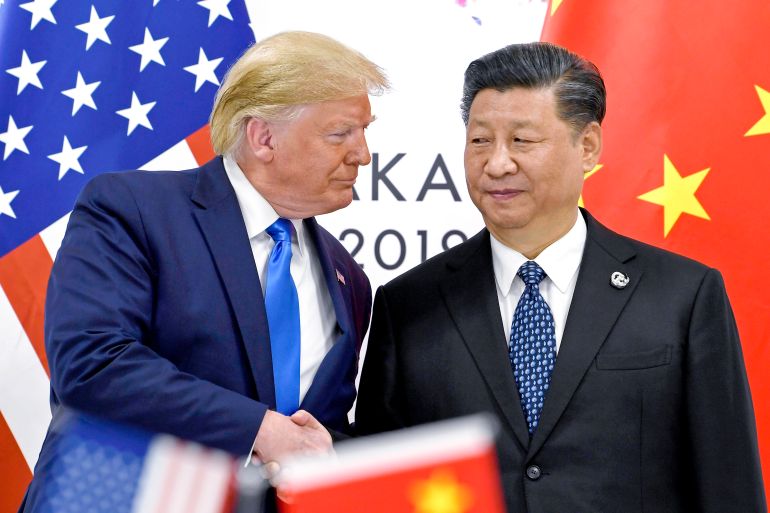
Today’s Top News In recent events, the trade relationship between the United States and China has taken several unexpected turns over the past few days. President Donald Trump’s administration initially imposed significant tariffs on Chinese imports, which were supposed to address their unfair trade practices. However, it later announced a 90-day suspension of the tariffs, especially targeting China, which has led to a strong reaction in the media and the public since the announcement. Discussing the events, we explore the reasoning behind the administration’s decisions, the backlash they have provoked, and the potential implications for future U.S.-China trade relations.
All points in this post
U.S.-China Trade Relations
The economic relationship between the United States and China has been characterized by both cooperation and conflict over the past few decades. As China’s economy expanded rapidly, it became a significant trading partner of the United States, creating a complex interdependence. However, issues such as trade imbalances, intellectual property rights violations, and market access restrictions have been persistent points of contention. These long-standing issues have set the stage for the trade disputes that have emerged in recent years.
Initial Tariffs by the Trump Administration
In an effort to address perceived unfair trade practices, the Trump administration has imposed significant tariffs on Chinese imports. The purpose of the tariffs was to pressure China to change policies it considers unfair to the United States, particularly on intellectual property theft and forced technology transfers. The administration argued that the measures were necessary to protect American industries and workers from unfair competition.
China’s Retaliatory Measures
In response to the US tariffs, China has implemented its own retaliatory tariffs targeting American products. The retaliatory tariffs are said to have affected a variety of sectors, including agriculture and manufacturing, escalating tensions between the two economic giants. China’s countermeasures were designed to pressure the United States by targeting politically sensitive industries, making it difficult to reach a negotiated settlement.

Trade War Intensifies
The trade war is intensifying with the imposition of reciprocal tariffs, with both countries expected to suffer economic consequences. Uncertainty over trade policy is contributing to market volatility and is expected to raise concerns about global economic stability. Businesses and consumers in both countries are beginning to feel the impact, leading to growing calls for a resolution to the dispute.
Announces 90-day tariff suspension
Amid mounting pressure and market volatility, President Trump announced a 90-day suspension on most new tariffs. The decision was influenced by appeals from more than 75 countries and concerns about the possibility of a global recession. However, China was notably excluded from the suspension, with tariffs on Chinese imports reportedly increasing to 125%. The move was intended to signal a willingness to negotiate with other countries while maintaining a firm stance on China’s trade practices.
Market reaction to tariff suspension
The announcement of the tariff suspension was said to have had an immediate positive impact on stock markets. Major indices posted significant gains, reflecting investor relief and optimism about a potential easing of trade tensions. However, analysts cautioned that underlying issues remain unresolved and that much of the forecast is likely to hinge on tangible progress in trade talks.
Tariffs on Chinese imports increase
Despite the general tariff suspension, the administration reportedly imposed a 125% tariff on Chinese imports. The decision underscored the administration’s focus on addressing specific grievances with China’s trade practices. The significant increase appears to have been intended to exert maximum pressure on China to engage in meaningful negotiations and implement structural reforms.
President Trump’s praise for President Xi Jinping
During the trade dispute, President Trump has occasionally expressed praise for Chinese President Xi Jinping. He has described Xi as a “smart man” and a “great leader,” indicating a personal relationship despite ongoing tensions. The praise appears to be strategic, aimed at keeping diplomatic channels open and signalling a willingness to reach a mutually beneficial agreement.
Media and Public Criticism
When President Trump cited people being “yippies” as the reason for his tariff rollbacks, the media and the public were reportedly not kind. Across the press, talk shows, and social media platforms, the term quickly became a parody. Critics found the term strange, vague, and even ridiculous, questioning whether it was a real term or just another Trumpism designed to downplay serious economic concerns. Memes spread on Twitter, late-night hosts floated the phrase, and even some political commentators on the right acknowledged that the message seemed confusing.
From a communications perspective, Trump’s language—whether tactical or ill-conceived—ultimately reinforced the narrative that the administration lacked a clear and effective plan to deal with China. And that notion is starting to feel as damaging as the economic reality.
Analysis of the word “Yippy” and its impact
Now, let’s talk about the word that started it all “Yippy.” What does it mean? No one really knows. It’s not a common word in economic or political discourse. Some have interpreted it as a shorthand for Trump’s “jerky” or “nervous,” suggesting that markets are overreacting. Others have suggested it’s a dismissive way of labelling critics and investors who were worried about the fallout from the trade war.
The implications are significant. In global trade, language and optics matter almost as much as numbers and policy. When the world’s largest economy signals indecision or confusion, it affects everything from global markets to diplomatic trust. In this sense, “Yippy,” in turn, becomes more than just a meme—it’s a metaphor for unpredictability.
What are the possible outcomes of the tariff break?
With the 90-day tariff break, aside from China, several possible outcomes are on the table and the global economic community is closely watching. First, the break is said to pave the way for meaningful negotiations. With pressure on most countries easing, the United States may be able to refocus its efforts on bilateral trade deals that are better aligned with Trump’s “America First” agenda. For China, the increased tariffs are clearly a power play, reportedly designed to force concessions on issues such as intellectual property theft, forced technology transfer, and market access.
Second, the break has the potential to backfire. If countries interpret the break as a sign of weakness or political instability, it could embolden adversaries rather than encourage cooperation. For example, China could dig in its heels, seeing the United States as divided and uncertain. In this scenario, trade tensions are expected to worsen after the 90-day window closes.
Third, the pause could bring short-term relief to American businesses and consumers. Tariffs often lead to higher costs, supply chain disruptions, and market uncertainty. By temporarily easing these pressures, companies could regain some stability, allowing them to plan and invest with more confidence. But again, if the pause is seen as temporary or politically motivated, it may not be enough to restore long-term confidence, the report said.
Finally, this 90-day period is a test of Trump’s negotiating strategy. He is betting that his personal relationship with President Xi and his unconventional tactics will bring China to the negotiating table. If it works, Trump is expected to claim a major political victory. If it fails, and tariffs are reimposed — or worse, more severe — the administration risks deep economic consequences and further political blowback.
In other words, the clock is ticking.
the end
This whole saga-tariffs, pauses, “Yippy” comments, and back-and-forth praise-captures the chaotic and dramatic nature of modern US-China relations under Donald Trump. On the one hand, Trump’s unconventional style has certainly shaken up the status quo, pushing back on the problems of the previous administration. On the other hand, the mixed signals, sudden changes, and frowned-upon language have created confusion and sparked criticism at home and abroad.
With the 90-day deadline drawing to a close, all eyes are on what happens next. Will there be any progress with China, or will tensions flare up even more? Will Trump’s gamble pay off, or will it backfire spectacularly, and perhaps most importantly-will we ever find out what “yippee” really means? Be sure to let us know your thoughts in the comments below.







